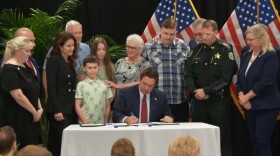A new Florida law taking effect Tuesday, July 1, will mandate that all high school student-athletes take an electrocardiogram or EKG before they can compete on school sports teams.
The Second Chance Act is the first of its kind – Florida is the first and only state to require high school student-athletes to get at least one EKG in their high school sports career.
The test which, is painless and only takes a few minutes to complete, detects heart conditions which can cause sudden cardiac arrest and death.
Although athletes don’t need to get tested until the 2026-2027 school year, results taken any time in the two years before the fall 2026 deadline will be accepted.
School districts are mandated under the new law to provide low-cost EKGs to all student-athletes in grades 9-12, and families can opt out for religious or medical reasons, or if their school does not provide an EKG at $50 or less.
The Florida High School Athletic Association (FHSAA) has until the 2028-2029 school year to develop bylaws or policies that prohibit a student-athlete who gets an abnormal EKG result from participating in tryouts, practice or competition.
Students will be able to participate in school athletics if and when their doctor clears them to participate.
If you’ve never had an EKG, this is what that looks like:
Other laws taking effect on July 1 that are aimed at protecting student health in Florida include:
- SB 112: this law expands early detection and intervention programs for students with autism, and mandates free autism testing in the state
- SB 772: this law requires Florida schools to have glucagon on hand to respond to and reverse diabetic shock in students
- SB 430: this law requires Florida schools to have automated external defibrillators or AEDs on campus to respond to and restart a student's heart after sudden cardiac arrest
- SB 958: this law requires Florida schools and early learning coalitions to develop and provide informational material to hand out to families about the early detection and treatment of Type I Diabetes
- SB 1514: this law mandates Florida schools train personnel to respond to a student’s severe allergic reaction. Schools must also have an action plan in place to respond to a severe allergic reaction on campus
- SB 1620: the Florida Department of Education will begin to assess the feasibility of using telehealth in rural and underserved schools to meet students’ mental health needs





